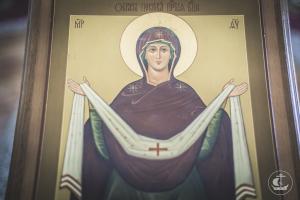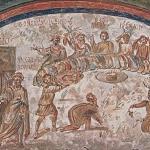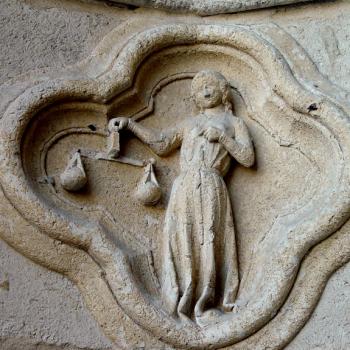
Christianity offers us a middle way between legalism and antinomianism. It does this by telling us we can’t be selfish, looking after ourselves, doing whatever it is we desire, regardless of the consequences of our actions, especially to others, but rather, we are to act in ways which engage and embrace the path of love. Love sets us free, even as it directs and guides us, making sure we act in ways which are for the good of all. When we love, we will avoid doing those things which we know would needlessly hurt those we love, be they others, or ourselves. It, nonetheless, also gives us a great deal of freedom, as it allows us to develop ourselves in and through our loving relationship with others. Love also energizes us, gives us what we need to transcend ourselves, as God, who is love, embraces that love and connects to us with it, giving us the grace we need to fulfill the expectations of love.
We are not in this world all by ourselves, and so we should not act in ways which suggest we are. Christianity is a communal faith. Everyone, we are told, finds their ultimate fulfillment in the community of faith, and not as a lone individual against the world. Love is what allows the community to form, and just as love helps guide every person to what is best for them, communal love helps direct the community, suggesting disciplines, when necessary, so that the community can stay together and promote the good of all.
Love always brings with it expressions of love. And as Christianity is a communal faith, Christians are to come together and find ways, as a community, to express and engage that love. This is achieved in public acts of worship. Christian worship must not be seen as some idle praise of God, for God certainly does not need such flattery. Worship is about the ways the faithful come together to embrace transcendent love, not only expressing that love together, but also finding that love can and will grow in such expression, so that they can become one and experience that transcendent unity. Worship, as it comes out of love, must also have some sort of freedom and expectations to it; the faithful must be able to develop their love, that is, establish ways of worship for themselves, sometimes allowing the community to develop expressions which one or few persons will not prefer. There is, in such development,also room for tradition, where the experiences and expressions of those who came before can and should have an influence in the developing engagement of the Christian community with God. Tradition, nonetheless, is to be living, not dead, influenced by the needs of the time, while also connecting with the wisdom and experiences of the past. That is why there has always been some form of regulation, some structure, given to worship, based upon what people did in the past, though that structure needs not remain unreformed or unchanged from generation to generation, which is why new forms of worship can and do develop. And, it is important to note, many elements of tradition, and the structure it has handed down to the present age, extends back to pre-Christian times, embracing what others learned about God, such as the way God engaged humanity through the people of Israel. In that engagement, we find there were guidelines established which helped direct and guide the faithful people of Israel, guidelines influenced by the inspiration of God, and yet developed by the people involved. “Now even the first covenant had regulations for worship and an earthly sanctuary”(Heb. 9:1 RSV).
Moses is said to have established many of the principles which the people of Israel were to follow. God allowed Moses, and later, the rest of the people of Israel, to develop the signs and symbols and rules and regulations they needed to best express their own relationship and experience with God. God continues to allow Christians to do this, though in both instances, it can be said, God provided inspiration to help make sure that there is a foundation for the disciplines and rituals the faithful establish for themselves. Sometimes, God’s allowance is very generous, such as the way God allowed Moses to come up with rules which allowed for divorce, because it fit the needs of the people (cf. Matt. 19:8). When Christians develop their disciplines, their own rules and regulations, they do so with the same spirit, understanding that many things can be permitted for the sake of the welfare of the people and their needs, and not as a way to affirm they should be done (which can be seen in the way the Christian East engages the notion of economia and the Christian West uses dispensations). What is important is that as we develop disciplines, we do so in order to better follow the Word of God, to follow the law which the Word of God revealed, which is the rule of love. We are to be patient and merciful to others, allowing our conscience to have a major role in our personal and communal developments, so that in the end, we willingly engage God, and not merely from some external pressure, for, as Paul pointed out: “The point is this: he who sows sparingly will also reap sparingly, and he who sows bountifully will also reap bountifully. Each one must do as he has made up his mind, not reluctantly or under compulsion, for God loves a cheerful giver” (2 Cor. 9:6-7 RSV).
In relation to this, we can look at the example of Mary, the Mother of God. She presents to us the fullness of love. She offered her love entirely to God, and through that love for God, she loves all of God’s creation and works for its benefit. Her great love has her constantly offering her protection to all in need. She is not God, and she is not all-powerful, which means, we should not expect more from her that she can give. She has been given grace, a great amount of grace, and so, as tradition suggest, she sometimes can personally intervene for the good of humanity (is that not a point made at the Wedding of Cana?), but often what she does is share in with us our petitions to God, adding her voice to ours. When we remember her, we remember, therefore, the bounty and actions of love, and the greatness which can come out of such love; we must embrace it ourselves, and follow her example, petitioning God and doing what we can, in and of ourselves and the grace we have been given, to protect and help those in need.
God wants lovers, and offers love to those who respond to divine love. That love will guide and direct us, inspiring us to further develop ourselves in those ways which best represent and express that love and its bounty. Our worship should never be disconnected from it – if it ever is, it then becomes like a clanging gong, loud and unseemly. This, sadly, seems to be the mistake many so-called traditionalists make. They don’t understand tradition. They don’t understand that it is love, not legalistic guidelines, which is at the heart of Christian worship. They don’t understand grace. They don’t even understand tradition and how and why it must change to meet the needs of the people. All they want is things to never change, to never grow, and so to deny the bounty of love which brings about such change. Without such love, the Christian faith will be a thing of pain and sorrow, and it should not be surprising, then, as many experience tradition without love they will want nothing of the pain and sorrow they experienced. Tradition without love, therefore, is a thing of pain and sorrow, as it is dead; but with love, it can thrive and develop, and with such development, lead people from glory to glory, not just in temporal existence, but with eternal theosis, where we will experience infinite transformation due to our constant, never-ending experience of divine love.
Stay in touch! Like A Little Bit of Nothing on Facebook.
If you liked what you read, please consider sharing it with your friends and family!
N.B.: While I read comments to moderate them, I rarely respond to them. If I don’t respond to your comment directly, don’t assume I am unthankful for it. I appreciate it. But I want readers to feel free to ask questions, and hopefully, dialogue with each other. I have shared what I wanted to say, though some responses will get a brief reply by me, or, if I find it interesting and something I can engage fully, as the foundation for another post. I have had many posts inspired or improved upon thanks to my readers.













